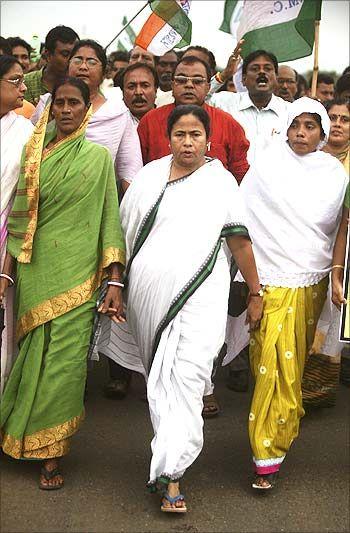Mamata Banerjee
 Mamata Banerjee was born to Gayetri and Promileswar Banerjee on October 5 1960 (but its officially recorded as 5 January 1955 in her matriculate certificate because she was underage when she appeared for her secondary examination, in Kolkata, West Bengal, India. She grew up in a lower middle-class family and started her political career in Congress[clarification needed]. As a young woman in the 1970s, she quickly rose in the ranks[clarification needed] to become the general secretary of the state Mohila Congress (1976–80). She was a college student in the mid-1970s when politics in Bengal began to accommodate the riffraff[clarification needed].
Mamata Banerjee was born to Gayetri and Promileswar Banerjee on October 5 1960 (but its officially recorded as 5 January 1955 in her matriculate certificate because she was underage when she appeared for her secondary examination, in Kolkata, West Bengal, India. She grew up in a lower middle-class family and started her political career in Congress[clarification needed]. As a young woman in the 1970s, she quickly rose in the ranks[clarification needed] to become the general secretary of the state Mohila Congress (1976–80). She was a college student in the mid-1970s when politics in Bengal began to accommodate the riffraff[clarification needed].Banerjee graduated with an honours degree in History from the Jogamaya Devi College, an undergraduate women's college in southern Kolkata. Later she earned a master's degree in Islamic History from the University of Calcutta. This was followed by a degree in education from the Shri Shikshayatan College. She also earned a law degree from the Jogesh Chandra Chaudhuri Law College, Kolkata.
Throughout her political life Banerjee has maintained an austere lifestyle, never spending much money on clothes, cosmetics or jewellery and always with a cotton bag slung on her shoulder. She has remained single throughout her life.
political career
In the West Bengal Assembly elections of 2011, Trinamool Congress and congress parties combined, a move spearheaded by Mamata Banerjee, successfully won with over 77% of the total seats. This is considered a historic victory over the Left Front rule.
Trinamool Congress
In 1997, Mamata Banerjee came out of the Congress Party in West Bengal and established the All India Trinamool Congress. It quickly became the primary opposition to the long-standing Communist government in the state.On 11 December 1998, she controversially held a Samajwadi Party MP, Daroga Prasad Saroj, by the collar and dragged him out of the well of the Lok Sabha to prevent him from protesting against the Women's Reservation bill.
In 1999, she joined the BJP-led National Democratic Alliance (NDA) government and was allocated the Railways Ministry
Railway Minister
In 2000, Mamata Banerjee presented her first Railway Budget. In it she fulfilled many of her promises to her home state West Bengal. She introduced a new biweekly New Delhi-Sealdah Rajdhani Express train and four express trains connecting various parts of West Bengal, namely the Howrah-Purulia Rupasi Bangla Express, Sealdah-New Jalpaiguri Express, Shalimar-Bankura Arannyak Express and the Sealdah-Amritsar Superfast Express (weekly). She also increased the frequency of the Pune-Howrah Azad Hind Express and extension of at least three express train services. Work on the Digha-Howrah Express service was also hastened during her brief tenure.
She also focused on developing tourism, enabling the Darjeeling-Himalayan section with two additional locomotives and proposing the Indian Railway Catering and Tourism Corporation Limited. She also commented that India should play a pivotal role in the Trans-Asian Railway and that rail links between Bangladesh and Nepal would be reintroduced. In all, she introduced 19 new trains for the 2000–2001 fiscal year.[23]
Chief Minister
Mamata Banerjee's Oath of Office,Taking the Oath at Raj Bhavan, Kolkata,Mamata Banerjee takes the oath of office as Chief Minister administered by Governor M. K. Narayanan on May 20, 2011.
Banerjee was sworn in as Chief Minister of West Bengal on 20 May 2011. As the first woman Chief Minister of West Bengal, one of her first decisions was to return 400 acres of land to Singur farmers. "The cabinet has decided to return 400 acres to unwilling farmers in Singur," the chief minister said. "I have instructed the department to prepare the papers for this. If Tatababu wants, he can set up his factory on the remaining 600 acres, otherwise we will see how to go about it," she added.
She has also been credited to solving the longstanding "Gorkhaland Problem"[clarification needed] by setting up the Gorkhaland Autonomous Council. , thus fulfilling another of her campaign promises.
She has started various reforms in education and health sectors. Some of the reforms in the education sectors include release of the monthly pay of the teachers on the first of every month and quicker pensions for retiring teachers.In health sector "A three-phase developmental system will be taken up to improve the heath infrastructure and service,” Mamata Banerjee said."
In fact she was instrumental in the rollback of the petrol price hikes and the suspension of FDI in Retail Sector until a consensus is evolved.











0 comments:
Post a Comment